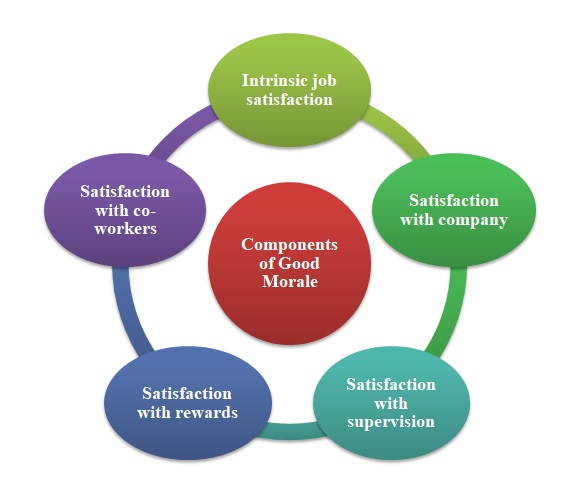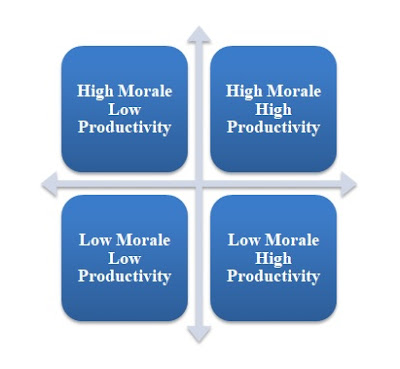Morale
Morale is a word with
multiple meanings. Mayo defined Morale as “the maintenance of cooperative living”.
In this sense Morale refers to a sense of belonging to a group. Dr. Leighton
described Morale as “capacity of a group of people to pull together persistently
and consistently in pursuit of a common purpose.” Therefore the acceptance of a
goal, and the commitment of the group to work for it are important components
of high Morale according to this view. Another point of view expressed by Prof.
Kossen links Morale with the attitudes of employees. It refers to the attitude
of ‘employees’ towards their employing organisations in general or towards
specific job factors, such as supervision, co-workers and financial incentives.
Writers like Halloran, to clear the fog, use the term Morale in two different
ways:
1. Individual Morale: Individual Morale involves knowing your own
expectations and living up to them. If we recognise our needs and how to meet them,
our Morale will be high. Here, Morale refers to an employee’s feelings toward
his job; it is a matter of job satisfaction.
2. Group Morale:
While Individual Morale is a person’s attitude toward life, Group Morale
reflects the general tone or, esprit de
corps, of a group of people. Each person increases the prospective of the
team spirit or lowers the concept of cooperative effort. Morale, used in this
sense, emphasises social reactions and focuses on attitudes toward group
values. Guion listed five factors as sources of satisfaction that contribute to
good Morale. Saying ‘my morale is high’ in a way means ‘I feel good’.
Measurement Methods of Morale:
Employees are, often,
reluctant to express their opinions and attributes in a fearless, bold manner.
The concept is intangible and subjective in nature. To obtain the truth, a
researcher may have to combine the various method of measuring Morale in a
tactful manner.
1. Observation:
Managers can detect changes in employee behaviour through careful observations.
This is not a reliable way to measure Morale, as observations may differ. Also,
observation alone may not be enough to put things in order. By the time a corrective
action is initiated, some other problem may vitiate the atmosphere.
2. Surveys: Morale surveys can be conducted to discover employees’ feelings towards their
colleagues, jobs and supervisors, company policy and the organisation as a
whole. Employee responses could be collected through a printed questionnaire or
through an interview.
3. Records:
Company records regarding absenteeism, grievances, spoiled work, labour
turnover, strikes etc., could also be examined to determine the level of employee Morale.
4. Suggestion Boxes: Employees may also have the opportunity to offer
suggestions, ventilate their grievances and present their complaints without revealing
their identity by asking them to write down everything and post them in drop
boxes located in strategic locations within the factory.
Factors Affecting Morale:
A. The Organisation: The goals of the organisation greatly influence the
attitudes of employees. If the objectives set by management are valuable,
useful and acceptable, workers develop a positive feeling towards the job and
the organisation. Also, a clear structure with well-defined duties and
responsibilities encourages people to work with confidence. The reputation of
the company is another important factor that is worth mentioning here. People
who work in reputed organisations experience feelings of pride and a spirit of
loyalty.
B. Leadership:
The actions of managers have a strong influence on the Morale of the workforce.
Fair treatment, equitable rewards and recognition for good work greatly affect Morale. Workers are comfortable working under an understanding and supportive
leader rather than one who is authoritarian, dictatorial and dominating.
C. Co-worker:
The bad attitude of co-workers influences others. Imagine working with a person
who talks about the negative points of an organisation throughout the day. Such
a person can make every workday an unpleasant experience for others.
D. The nature of work: Boring, monotonous, repetitive work negatively affects
employee Morale. On the other hand, if an employee is asked to do something
interesting and challenging, his morale may be high.
E. Work Environment: Morale is a direct function of the conditions in
the workplace. Clean, safe, comfortable and pleasant work conditions boost Morale.
F. The Employee:
The way employee view himself also has a lot to do with Morale. For Example, people
who lack self-confidence or who suffer from poor physical or mental health often
develop Morale problems. Further, how employees’ personal needs are met can
significantly influence their Morale. Salary, fringe benefits, DA rates,
allowances can affect employee morale in a positive or negative way, when compared
to others doing similar jobs.
Relationships Between Morale & Productivity:
It is generally
believed that high Morale will lead to high productivity. However, Prof. Keith
Davis points out that there is not always a positive correlation between the
two. A manager can push for high productivity by using scientific management,
time studies and close supervision. High production and low Morale may result,
but it is doubtful whether this combination can last. The opposite can also happen
– there can be low production with high Morale. In this case, the manager works
so hard to please his subordinates that they are too happy to work hard for
themselves.
Research by Rensis
Likert indicated the fact that there can be different combinations of Morale and Productivity: High Morale and Low Productivity, High Morale and High Productivity; Low Morale and High Productivity; and Low Morale and Low Productivity. Relationships between Morale and Productivity are shown through
this Figure:
In the final analysis,
a manager has to work to improve the Morale of his employees. High Morale makes
work more enjoyable and will go a long way toward improving the work environment.
It helps the work group to reach their goals easily, smoothly and more importantly,
in a highly cooperative manner. But the important point here is how do you raise
employees’ Morale? What about the role of management in building Morale in the
organisation? Let’s cover this topic in the next section.
Morale Building:
Maintaining a reasonable
level of Morale is not an easy job. Listed below are some of the important
steps management needs to take, also on a continuous scale:
1. Remuneration: Remuneration
must be fair and equitable. It must be fair in relation to the skills and
abilities of employees and fair in relation to the prevailing wages in the
industry.
2. Job Security: Employees
must be sure of their job and its continuity.
3. Participation:
Employees should be treated as ‘resources’, not as a ‘tools’. They must be
allowed to participate in all the important decisions that affect their lives
in the organisation. Participation makes employees more committed to their job
and allows them to exchange their ideas and suggestions with others.
4. Job Enrichment: Enrichment
is a process to make jobs more responsible, challenging and interesting.
Enriched jobs offer employees opportunities for achievement, recognition and
growth.
5. Organisation
Structure: Tall structures increase the distance between the manager and his
employees. Communication is frequently distorted and control becomes difficult.
Flat structures allow the employee to approach the manager and discuss the
implication of commands on a face-to-face basis. A healthy interchange of ideas
can often occur, paving the way for a positive work climate.
6. Grievance Redressal:
Many times, Grievances are the cause of low employee Morale. Using a
well-established procedure helps resolve employee grievances promptly. The employee’s
case is presented to the appropriate authority on time, ending unpleasant discussions
and conflicts.
7. Employee
Counsellors: Companies can have the services of behavioural scientists to
address important findings of low employee Morale, i.e., absenteeism,
tardiness, turnover etc. The basic role of the consultant is to help employees
with their problems and complaints and get them on the right track quickly.
8. Sound Leadership:
Top management must be genuinely interested in the employees at all levels.
They must undertake sound human resources practices (prompt grievances
redressal, safety measures, discipline rules, welfare activities, equitable
compensation schemes) to build good employee relationship. They must listen to
the problems of employees through their actions. Morale surveys, absenteeism
and turnover records, observation and listening, all help get you started quickly.
The attempt, ultimately, must be to improve the mental health of employees.












0 Comments
Please do not enter any spam link in the comment box.